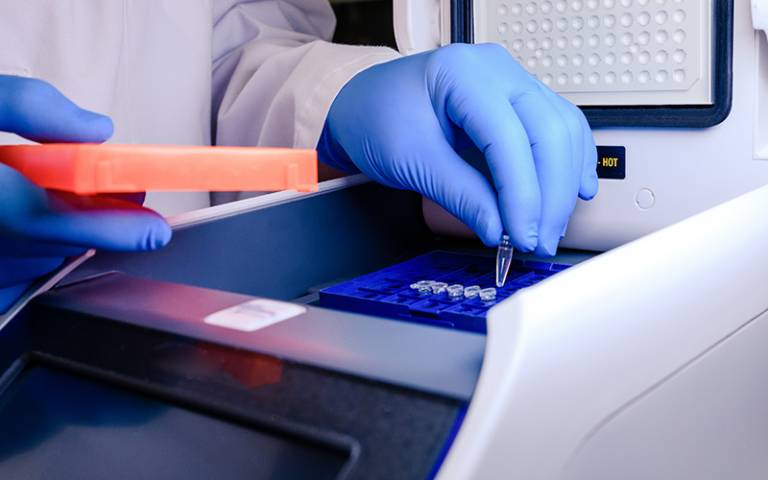Covid-19 pandemic has increased trust in genetics
25 January 2023
A survey of over 2,000 British adults, conducted in part by a UCL researcher, finds that trust in genetics is high, and went up significantly during the pandemic.

The survey findings feature in a report published online by the Genetics Society and have also fed into a peer-reviewed research paper, published in PLOS Biology, which reports that people with more extreme attitudes towards science have the most self-confidence in their understanding of science.
Given the increased public profile of science since the start of the Covid-19 pandemic, including the introduction of PCR testing and vaccine development into the public consciousness, researchers from the Universities of Bath, Cambridge, Oxford, UCL, and Aberdeen wanted to find out what the public felt about genetics and whether this new exposure of the science has made a difference.
With funding from the Genetics Society, they commissioned a survey of over 2,000 randomly selected British adults through public polling company Kantar Public. The researchers found that as a baseline most people were trusting of genetic technologies before the pandemic, based on the results of previous surveys and from asking people to think back to their attitudes pre-pandemic. Nearly half (45%) reported they trusted genetics to work for the societal good. 37% were neutral on this question, while 18% said they did not, and only very few (1-2%) were strongly distrusting.
When asked if their trust in genetics had gone up through the pandemic, four times more people said their trust had increased than those who reported that it had gone down. Trust in science more generally had strongly gone up with a third saying it had increased.
Not only has trust in science gone up, but people also want to hear more about it. Less than 10% thought there is too much coverage of the science in the media, while 44% reported that they want to hear more about it.
Co-lead author Professor Laurence Hurst (University of Bath) said: “This is potentially important to know – scientists have a tendency to stick in their labs, but it looks like, for the most part, public not only trust us but that this trust has gone up somewhat and many want to hear more from us about our work.”
Co-author Dr Adam Rutherford (UCL Genetics, Evolution & Environment) said: “We often hear that trust in science is at a low point, but what we found is that most people do trust the science of genetics as the basis of how we address global issues such as pandemics. However, scientists should not be complacent: we also found that the exposure of genetics during the pandemic made those suspicious of science more distrusting, despite the evidence.
“In a world where these voices can easily be amplified, we must be vigilant that our processes, methodologies and results are clearly and transparently communicated.”
In the PLOS Biology paper, the researchers report that people with strong attitudes tend to believe they understand science, while neutrals are less confident. People with strong negative attitudes to science tend to be particularly overconfident about their level of understanding.
Psychologically, the team suggest, this makes sense: to hold a strong opinion you need to strongly believe in the correctness of your understanding of the basic facts. The current team could replicate prior results finding that those most negative tend also not to have high textbook knowledge. By contrast, those more accepting of science both believe they understand it and scored well on textbook fact (true/false) questions.
When it was thought that what mattered most for scientific literacy was scientific knowledge, science communication focused on passing information from scientists to the public. However, this approach may not be successful, and in some cases can backfire. The present work suggests that working to address the discrepancies between what people know and what they believe they know may be a better strategy.
Co-author Professor Anne Ferguson-Smith (University of Cambridge), President of the Genetics Society, said: “Confronting negative attitudes towards science held by some people will likely involve deconstructing what they think they know about science and replacing it with more accurate understanding. This is quite challenging.”
Co-author Professor Alison Woollard (University of Oxford) added: “We think we have established the limits of science communication. Despite all the talk of PCR over the last many months, we found that 30% hadn’t heard the term or knew it was a tool for testing for the virus. It is hard to see how any science can have more exposure than PCR has had. We need to be realistic and understand that, no matter what, we will never reach everyone. For informing people about things like vaccines this is important to know.”
Links
- Report published by the Genetics Society
- Research paper in PLOS Biology
- Dr Adam Rutherford’s academic profile
- UCL Genetics, Evolution & Environment
- UCL Biosciences
- UCL Faculty of Life Sciences
Image
- Loading a DNA tube into a PCR (polymerase chain reaction) thermocycler machine in a bioscience laboratory. Credit: dhdezvalle on iStock
Media contact
Chris Lane
Tel: +44 (0)20 7679 9222
Email: chris.lane [at] ucl.ac.uk
 Close
Close

